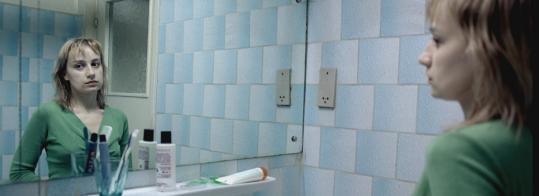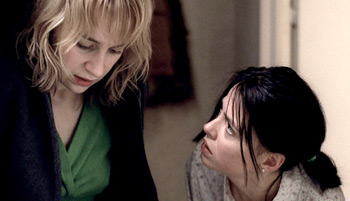4
Months, 3 Weeks and 2 Days, directed by Cristian Mungiu,
played at the
2007 Festival Nouveau Cinéma. Philippa
Hawker, who writes for The
Age, gave the film 4.5 out of 5 stars.

There's
a sense of very different kinds of time at work in Cristian
Mungiu's 4 Months, 3 Weeks and 2 Days, a quietly
powerful, engrossing movie that won the Palme d'Or for best
film at Cannes and numerous awards at other festivals.
Among
other things, it's a movie about duration, urgency, inevitability.
The
title refers to the elapsed stage of a pregnancy: the film
itself takes place over the course of a day and night, and
it plays out in long, slow, spellbinding but sometimes agonizingly
eventful takes, which have the effect of both intimacy and
distance, discretion and insistent focus. There is the feeling
of the camera's steady, unflinching contemplation, whether
we are being shown a character moving about a room, an encounter
between two people or an extended scene full of overlapping
conversations and exchanges.
Sometimes,
Mungiu elides events, and sometimes he allows them to unfold
with real-time awkwardness, but what is on screen is never
less than compelling.
The
movie is set in Ceausescu-era Romania of the 1980s. Its focus
is on two young women, Otilia (Anamaria Marinca) and Gabi
(Laura Vasiliu), who are roommates in a university dormitory.
Otilia is at the centre of the film, and it is her progress
that we follow, as we watch her assembling supplies, items
that have either a practical application or can be used as
bribes or gifts to smooth over arrangements and make deals.
Brand names are talismanic: a packet of Kent cigarettes seems
to be the most desirable item of exchange.
Gradually
it also becomes clear that something specific is being organised:
Gabi is pregnant and has sought an abortion, and Otilia is
coming with her to help her through the process. It also becomes
apparent, as Otilia goes about the task, that Gabi's arrangements
are flawed, that she his leaving things to Otilia to work
out if there are complications or difficulties.
 Marinca
- who appeared in David Yates' TV series Sex Traffic
-- makes Otilia a purposeful, resilient character, self-aware
and resourceful. Vasiliu gives Gabi a pliant, recessive presence,
a kind of deflecting energy. She creates spaces that Otilia
is forced to fill. Otilia has to renegotiate on her friend's
behalf, and make arrangements that Gabi has failed to follow
through with. It is Otilia who makes contact with the abortionist,
Bebe (Vlad Ivanov).
Marinca
- who appeared in David Yates' TV series Sex Traffic
-- makes Otilia a purposeful, resilient character, self-aware
and resourceful. Vasiliu gives Gabi a pliant, recessive presence,
a kind of deflecting energy. She creates spaces that Otilia
is forced to fill. Otilia has to renegotiate on her friend's
behalf, and make arrangements that Gabi has failed to follow
through with. It is Otilia who makes contact with the abortionist,
Bebe (Vlad Ivanov).
Ivanov
presents Bebe as a disconcerting combination of matter-of-factness,
self-righteousness, aggression and predatory ruthlessness.
But whatever tone he adopts, he presents himself as the victim,
as the one taking risks and being taken advantage of. It's
a deftly conveyed, distressingly convincing performance.
Otilia
has another responsibility. She also has to incorporate into
her schedule an event that her boyfriend demands that she
attend - his mother's birthday dinner. At the dinner table,
Otilia sits quietly: in this beautifully observed scene, there
is the sense of a different set of pressures, another social
hierarchy, another world of negotiations and deals, systems
and expectations.
What
Mungiu evokes is a world of rigid controls and rules, and
ways in which people circumvent, exploit or are compelled
by these restrictions. It might be steeped in the details
of a historical moment, it might have grimly specific scenes
that revolve around a specific event, but it is not simply
about a particular time and place. Nor is it "about"
abortion, in the way, for example, that Vera Drake
is.
It
is a precisely detailed, resonant account of individual survival
mechanisms, choices and decisions.
Also
reviewed by Philippa Hawker:
IRINA
PALM